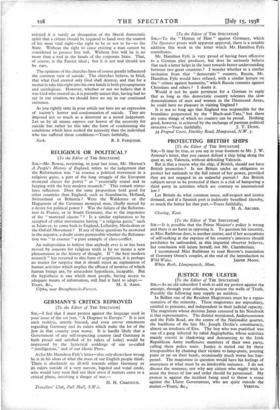RELIGIOUS OR POLITICAL ?
[To the Editor of THE SPECTATOR] SIR,—Mr. Rowse, reviewing, in your last issue, Mr. Morton's A People's History of England, refers to the judgement that the Reformation was " in essence a political movement in a religious guise, a part of the long struggle of the European moneyed classes for power " as " essentially sound and in keeping with the best modern research." This remark stimu- lates reflection. Does the same proposition hold good for other countries than England, such as Scandinavia, Holland, Switzerland or Bohemia ? Were the Waldenses or the Huguenots of the Cevennes moneyed men, chiefly moved by a desire for political power ? Was the failure of the Reforma- tion in France, or in South Germany, due to the impotence of the " moneyed classes " ? Is a similar explanation to be accepted of other movements having " a religious guise," such as Islam or, to come back to England, Lollardry, Methodism or the Oxford Movement ? If any of these questions be answered in the negative, a doubt seems permissible whether the Reforma- tion was " in essence " a pure example of class-conflict.
An indisposition to believe that anybody ever is or has been moved by concern for religious truth is by no means a new phenomenon in the history of thought. If " the best modern research " has reverted to this form of scepticism, it is perhaps no matter for surprise that it should reject an explanation of human activities which implies the efficacy of motives of which human beings are, by antecedent hypothesis, incapable. But the hypothesis is one which most people, having access to adequate means of information, will find it hard to adopt.—
Yours, &c., M. S. Amos. Ulpha, near Broughton-in-Furness.










































 Previous page
Previous page